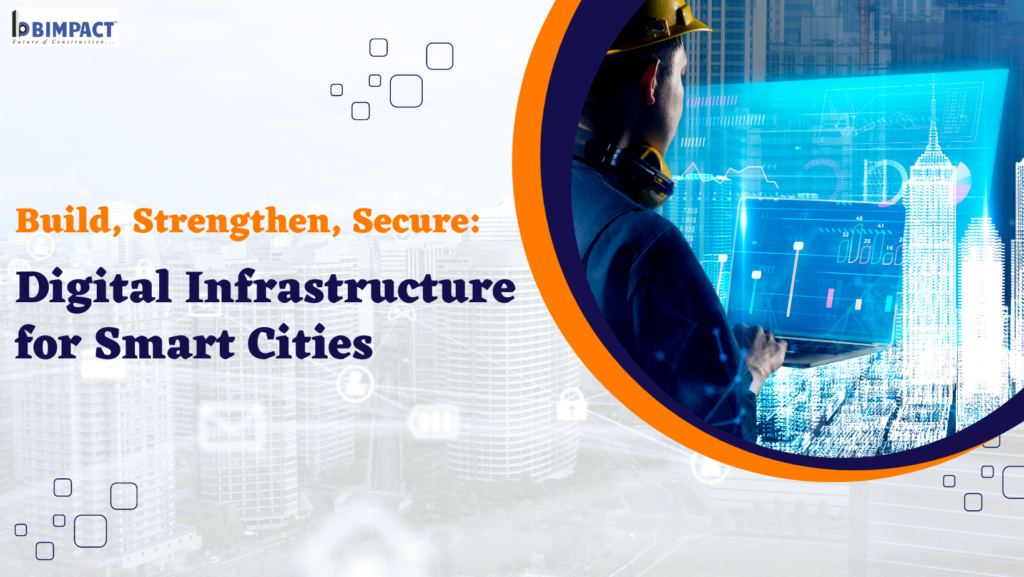Phone: (IN) +91 80035 33335 (USA) +1 720 800 8859 Email: info@bimpactdesigns.com
Build, Strengthen, Secure: Digital Infrastructure for Smart Cities
Smart cities are becoming increasingly prevalent as cities around the world adopt digital technologies to improve their services and enhance the quality of life for citizens.
However, the success of these smart cities depends on the reliability, security, and efficiency of their digital infrastructure.
In this blog post, we will explore the importance of building, strengthening, and securing digital infrastructure for smart cities.

Building Digital Infrastructure for Smart Cities
Digital infrastructure for smart cities involves a range of complex technologies, such as Internet of Things (IoT) devices, data analytics, and cloud computing.
These technologies enable cities to gather and analyze data to make more informed decisions about things like traffic management, waste management, and public safety.
To ensure that digital infrastructure is scalable and adaptable, smart cities must adopt open standards and ensure that digital infrastructure is designed with interoperability in mind.
This will allow smart cities to integrate new technologies as they emerge and enable digital infrastructure to handle a wide range of devices and data sources.
For example, Singapore is often cited as one of the world’s smartest cities, with a digital infrastructure that supports a range of innovative services and applications. Singapore uses IoT sensors to monitor traffic and optimize traffic flow, resulting in reduced congestion and faster commute times for citizens.
Additionally, Singapore has implemented a range of smart waste management solutions, including sensors that detect when bins are full and need to be emptied.
Strengthening Digital Infrastructure for Smart Cities
Strengthening digital infrastructure involves ensuring that it is resilient and reliable. This requires careful planning and investment in redundant systems and backup power supplies.
Additionally, it is essential to monitor the performance of digital infrastructure continuously to identify and resolve any issues before they become critical.
Smart cities must invest in digital infrastructure and implement robust security measures to improve their services and enhance quality of life for citizens.
By ensuring that digital infrastructure is scalable, adaptable, and reliable, cities can position themselves to take advantage of new technologies as they emerge.
For example, Seoul in South Korea has implemented a range of measures to strengthen its digital infrastructure. The city has built a redundant fiber-optic network that can continue to function even in the event of a disaster.
Additionally, Seoul has implemented a range of smart transportation solutions, including real-time traffic monitoring and intelligent traffic signal systems, to reduce congestion and improve the flow of traffic.
Securing Digital Infrastructure for Smart Cities
As cities become more connected and data-driven, they become vulnerable to cyber threats. Therefore, it is crucial to implement robust security measures to protect sensitive data and prevent unauthorized access. This can be achieved through measures such as encryption, authentication, and access controls.
For example, Dubai in the United Arab Emirates has implemented a range of security measures to protect its digital infrastructure. The city has implemented a cybersecurity strategy that includes measures such as network segmentation, identity and access management, and continuous monitoring.

Conclusion
In conclusion, building, strengthening, and securing digital infrastructure is critical for smart cities to thrive in the 21st century. By investing in digital infrastructure and implementing robust security measures, cities can improve their services and enhance quality of life for citizens.
Furthermore, by ensuring that digital infrastructure is scalable, adaptable, and reliable, cities can position themselves to take advantage of new technologies as they emerge.
The success of smart cities depends on the reliability, security, and efficiency of their digital infrastructure. Smart cities must invest in digital infrastructure and implement robust security measures to improve their services and enhance quality of life for citizens. By ensuring that digital infrastructure is scalable, adaptable, and reliable, cities can position themselves to take advantage of new technologies as they emerge. We look forward to seeing more cities embrace digital infrastructure in the years to come and build the smart cities of tomorrow.
Learn more about our BIM Services with BIMPACT Designs.
